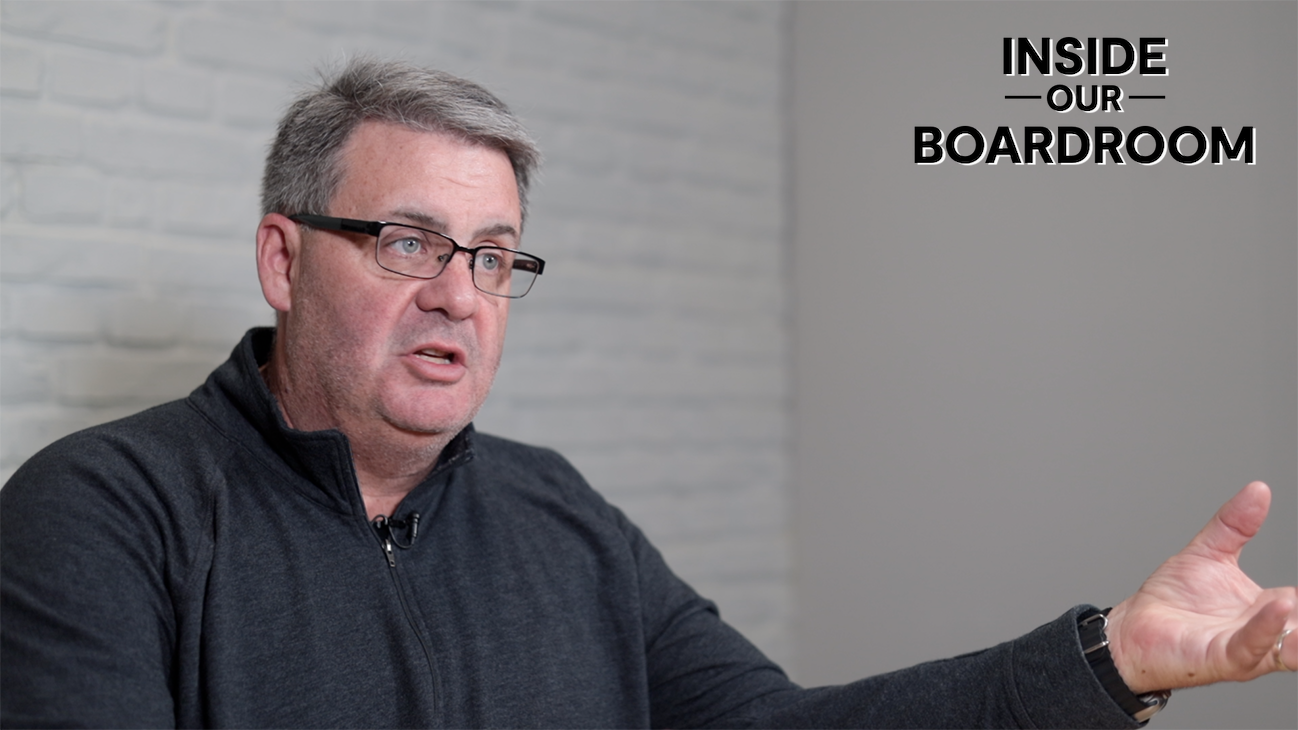Chief Matthew Pegg has built his career on a simple principle: being at his best when things are at their very worst. With over 32 years as a first responder, including eight years leading Canada’s largest fire and emergency services, Pegg has navigated some of the most complex crises in North American history — most notably as Toronto’s COVID-19 Incident Commander during the pandemic.
Specializing in crisis decision-making, authentic leadership, and what he calls being an “architect of how”, Matthew now shares his pressure-tested strategies to help leaders navigate uncertainty and build resilient organizations. He recently joined us “Inside Our Boardroom” where he explored the power of crisis leadership principles in everyday business, why authentic leadership is essential to success, and how the incident command system that saves lives can transform how organizations respond to any challenge.
Answers have been edited for length and clarity.
Building a Leadership Foundation
Speakers Spotlight: What drew you to becoming a firefighter? What core leadership principles have remained a constant for you throughout your career?
Matthew Pegg: My entry into the fire service was not planned. I was a young guy just out of high school. working as an apprentice mechanic in the small town where I was born and raised. One of the requirements was to do a first aid course.
The first thing they taught us was that when there’s a medical emergency, we need to recognize it and immediately call for help. I remember that I was immediately intrigued. Who are these people coming to help? That set me off onto this quest. I lived and worked in the town, I worked at the garage as a mechanic, and that made me an ideal candidate to become a volunteer firefighter, and the rest is history.
There is something called the incident management system and it’s a very structured system of approaching emergencies and crisis. It organizes things into definable and measurable actions that are defined by strategy, tactics, and tasks. It tackles the big picture — organizing the response, the strategy, what the overarching number one priorities are, how we’re going to achieve it, and of course, all the individual tasks that will contribute to that.
That’s the basis for the incident command system and this system is implemented hundreds and hundreds of times a day here. When I was appointed as the incident commander leading the response to COVID-19, I had the unique opportunity to take that very same system and apply it to, in essence, the biggest emergency in our history.
Lessons Learned from COVID-19 Crisis Management
SpSp: You were the City of Toronto’s COVID-19 Incident Commander during the pandemic, what lessons did you take away from that experience?
MP: It really drove home for me the importance of crisis decision-making and the ability to make decisions under pressure. The reality is that you are always going to have incomplete, imperfect, and often incorrect information. Yet, you still have to make a decision. You have to mobilize and do something. That places a lot of stress and pressure on leaders because we are always going to be wrong. No matter what we do, we’re going to make mistakes. I call this skill “always failing to action.”
The mistake people make when emergencies or crises happen is that they fail by doing nothing. The crisis decision-making skill is about using your expertise to make the best decision you can with the information you have, knowing that it will be imperfect, and then very quickly pivoting and continuing to pivot and refine your decision as information comes in and as you learn more.
In his keynote, “Leading Through Crisis”, Matthew shares the skills that emergency incident commanders use to manage and lead through emergencies and crises. He equips audiences with the recipe for results when they matter the most, outlining the crisis management playbook to help them thrive under pressure.
Building Trust through Authenticity
SpSp: How does trust factor into a strategy? And how does one cultivate it within their organizations?
MP: There are a couple of really key lessons and fundamentals that I have learned, admittedly, the hard way — oftentimes by doing it wrong — that really resonate with me about trust.
Number one, whether it’s your team, the public, your shareholders, whoever is relying on you during difficult times, their trust will be largely influenced and almost exclusively determined by whether or not they perceive you as being authentic.
Authenticity as a leader is beyond vital. But it’s a difficult thing for leaders because the primary ingredient to authenticity is vulnerability. It’s being willing to expose yourself, to let others see you hurt, scared, and just all of the things that make you human. That vulnerability is what drives authenticity in leadership.
The second thing that is equally important and that has been fundamental in my experience is being the face and voice of calm amidst the backdrop of anxiety. That is something that I learned early on in my career, and it certainly became very real for me when dealing with global media. Being able to reassure people through a very focused and calm demeanour is a gift that is often immeasurable when things are at their worst.
The “Architect of How” Philosophy
SpSp: You call yourself an “architect of how”. Can you outline what that means?
MP: “Architect of how” comes from a cool place and the short way to explain this is this. No matter who we are or where we work, I’ve never met one person that says, I really need more people around me who can find problems. We are not lacking people who can find and identify problems and tell you about them. What we are lacking is people who create solutions to those problems.
When people ask me for one piece of advice, it’s to be an architect of how. If you can position yourself, if you can build a reputation for yourself that you are somebody who doesn’t know the word “can’t” or the word “won’t”, and just walks into a situation saying, “I don’t know how to solve that, but I’m going to solve that”, that is a golden egg. That is someone that regardless of the industry, the organization, etc., that person is going to be recognized immediately as special.
So, if you can put yourself in that head space and come to work every day committed to being a problem solver and, in essence, creating these pathways to “how”, you have a skill set that will be in global demand for as long as you want to do it.
In his candid and entertaining keynotes, Matthew shares some of the most powerful and important life and leadership lessons learned from his prolific career overseeing some of the largest and most complex emergencies in North American history. They are truly a collection of lessons learned the hard way.
Mental Health and Organizational Resilience
SpSp: Today, you are the Chief Operating Officer of Warrior Health. How would you approach health and safety in today’s uncertain circumstances?
MP: It starts by having the courage to talk about things we don’t understand, that worry or scare us, and just being comfortable with being uncomfortable.
When we get into that space, it’s such a rewarding thing, and I’m seeing more and more people being proactive about this. C-suite and executive leadership teams are thinking of ways they can populate or teach this skill or way of thinking to ensure it’s around the C-suite table.
There are some methodologies or principles from incident command and emergency response that work really well. The three ingredients for success are authority, accountability, and responsibility.
If we don’t have enough of one of those three things, we end up failing. And that personal failure in a professional context creates an organizational failure. So it’s important to really dive into those issues and ensure that organizations and teams know how to be nimble and that they’re comfortable with the unknown.
The good thing is that these are teachable skills. They’re skills that we can learn and their processes that can be taught. I’m excited about the fact that there’s more and more corporations, organizations, and associations that are recognizing we need this skill in our leadership team today.
In his role of Chief Operating Officer of Warrior Health, Matthew is leading the provision of mental health and resilience supports for Ontario’s more than 80,000 public safety personnel. He speaks to both workplace health and safety and mental health in his keynotes.
Hire Matthew Pegg to Speak at Your Event
Chief Matthew Pegg‘s proven insights on authentic leadership, decision-making under pressure, and the “architect of how” mindset can equip your team with the skills to thrive in any challenging situation.
Contact Speakers Spotlight to bring Matthew’s powerful leadership strategies to your next event and learn how to turn uncertainty into opportunity.




